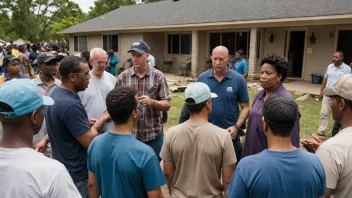What role do faith communities play in mental health advocacy?
Faith communities often serve as critical support systems for individuals facing mental health challenges. They advocate for policy changes by raising awareness, providing resources, and fostering an environment of understanding and acceptance. By addressing mental health stigma within their congregations and communities, they create a space where individuals feel safe to seek help.
How do faith leaders contribute to mental health awareness?
Faith leaders can play a significant role in mental health awareness by incorporating discussions about mental health into their sermons and teachings. They can educate their congregations about the importance of mental wellbeing and encourage members to seek help when needed. Additionally, they can collaborate with mental health professionals to provide workshops and seminars.
What initiatives have faith communities launched to support mental health?
- Support Groups: Many faith communities have established support groups for those struggling with mental health issues, providing a safe space for individuals to share experiences and find solace.
- Community Outreach Programs: Initiatives that offer mental health screenings and resources during community events help reduce stigma and promote mental wellness.
- Partnerships with Mental Health Organizations: Collaborating with local mental health organizations allows faith communities to provide professional support and resources to their members.
How can individuals within faith communities get involved in mental health advocacy?
Individuals can get involved by educating themselves about mental health issues, volunteering for local mental health organizations, or participating in advocacy campaigns. They can also bring up the topic of mental health within their faith communities, encouraging discussions and promoting awareness.
What are some challenges faith communities face in advocating for mental health?
One major challenge is the stigma surrounding mental health, which can lead to reluctance among individuals to discuss their struggles openly. Additionally, some faith communities may lack the resources or knowledge necessary to effectively advocate for mental health policies. Overcoming these barriers requires a commitment to education, dialogue, and collaboration.
How can faith communities influence mental health policy changes?
Faith communities can influence mental health policy changes by organizing advocacy efforts, such as letter-writing campaigns to local representatives or participating in public forums. They can also join coalitions with other organizations focused on mental health to amplify their voices and push for legislative changes that benefit mental health services.
What impact does spiritual support have on mental health?
Spiritual support can significantly impact mental health by providing individuals with a sense of purpose, community, and belonging. Faith practices such as prayer, meditation, and community worship can promote emotional resilience and coping mechanisms, aiding individuals in managing their mental health challenges.
How can faith communities ensure they are inclusive of all mental health experiences?
To ensure inclusivity, faith communities should actively engage with diverse populations and consider the unique mental health challenges faced by different groups. This can involve training leaders to recognize and address various mental health issues, as well as creating resources that are accessible to everyone, regardless of their background.
What resources are available for faith communities looking to advocate for mental health?
- National Alliance on Mental Illness (NAMI): Provides resources and training for faith communities to address mental health.
- FaithNet: Offers tools for faith leaders to integrate mental health awareness into their teachings.
- Local Mental Health Organizations: Many local organizations provide resources and support for faith communities looking to advocate for mental health.
How can I stay updated on mental health advocacy efforts within faith communities?
To stay informed, individuals can subscribe to newsletters from mental health organizations, participate in community forums, and follow relevant social media accounts. Engaging with local advocacy groups can also provide insights into ongoing efforts and initiatives.
Wrap-Up: Faith communities are vital in advocating for mental health policy changes. By fostering awareness, providing support, and influencing policy, they can significantly impact the mental wellbeing of their members and the wider community. Everyone has a role to play in this important advocacy work, and by coming together, we can create a more compassionate and supportive society.






